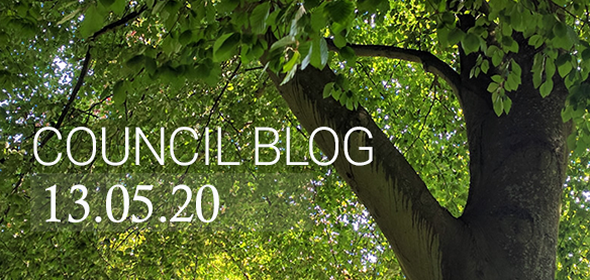Author: Philip Greenish, Chair of Council
Please note: information in this blog was accurate at the time of the meeting – 13 May 2020 – and may now have been superseded.
Council met on 13 May in ‘virtual mode’ with all members attending via Microsoft Teams. Olivia Reed, incoming President of the Students’ Union (SUSU), joined as an observer. The meeting was held in three parts: the first dealt with what could be termed ’normal’ Council business; the second consisted of briefings from a number of the University’s experts who are working on different areas affected by COVID-19. There was also a question and answer session with our experts. The third focused on the University’s response to COVID-19 and scenario planning, and then on how Council will operate as we set about shaping the University’s immediate and longer-term approach.

Right at the start of the meeting, Council wanted to express its admiration and thanks for the extraordinary work carried out across the University to reconfigure teaching and assessment such that it could be delivered remotely. All indicators suggest that, for the most part, this has been done very well indeed in the most challenging of circumstances. We recognised the strong focus on staff and student welfare and on clear communications and decision-making, which has been well-received. We also noted the contributions to the local and national COVID-19 response from colleagues and the excellent media coverage our University has been receiving.
In the ’normal business’ section, the Vice-Chancellor briefed us on the higher education sector response to the crisis, the emerging support from government, the lobbying efforts by sector groups such as the Russell Group and Universities UK (UUK), as well as the national research situation (including help with immediate funding). In her report, Emily Harrison, outgoing SUSU President, raised the issue of tuition fee refunds in light of COVID-19 and presented a case for some groups of students who had been particularly affected by the move to remote learning. While Council sympathised, the government has been clear on its policy and it remains the case that essential learning outcomes will be achieved despite the obvious changes to the format of some education provision. Council asked that the discussion be taken offline to the people who could most appropriately deal with the specific questions asked.
The COVID-19 response briefing from four university experts was extremely valuable in helping Council members understand the impact of some of our work on the national crisis response, and to question areas where either the science or the policy is unclear. It also prepared us for the discussion on the University’s response to COVID-19 which formed the major part of the meeting and which was broken down into key elements.
We considered firstly the implications of the changes in education arrangements for the medium and longer term, as well as the immediate impact. We noted how important the close working relationship with SUSU has been, as well as the excellent work of iSolutions. The virtual learning environment (VLE) is working well, and there have been few IT issues. Council members voiced a desire to experience for themselves what online teaching is like, and this will be arranged shortly. We considered progress with preparations for the next academic year, including the establishment of a 2020-21 Delivery Group, and the implications for international students who have been surveyed on their intentions. This has led to consideration of a dual start (September 2020 and January 2021) for some programmes.
We discussed progress towards the opening of research laboratories, which has been encouraged by government. This looks possible for early June under strict social distancing and hygiene measures. New ways of working, including 24/7 availability, are being considered. Ensuring the health, safety and wellbeing of staff and students has been paramount throughout the crisis, and will remain a top priority as we head further into uncharted waters.
Council is ultimately responsible for the financial sustainability of the University. This year’s planned financial surplus has potentially turned into a deficit, and we agreed the expenditure controls for the rest of this financial year. We also agreed some changes to the prioritisation of estates and 10-Year Plan projects, as well as the importance of progress on elements which are crucial to our future. Scenario planning, in which some Council members have already been involved, is gaining pace ahead of some big decisions which will be needed to ensure we can continue to provide the high-quality education and research expected of a civic and global university.
Finally, Council considered how it should operate now that the institution is passing the immediate crisis response phase. We decided that we should meet more regularly between formal Council meetings. These would be short meetings with no specially prepared papers and notes of key points and decisions only. We would use them for updates and to set up any other activities involving Council members. We confirmed that some lay members would take an additional, informal role in supporting the executive in the following key areas: education, widening participation and the student experience; research and enterprise; communications and marketing; estates; information systems; and international. We agreed to maintain a programme of deep dives and virtual faculty/professional services visits and that we would use the experience of this extraordinary period to develop how we conduct our business in the longer term.
In concluding, we thanked Emily Harrison, who was attending her final Council meeting, for her excellent contribution during her period of office as SUSU President.